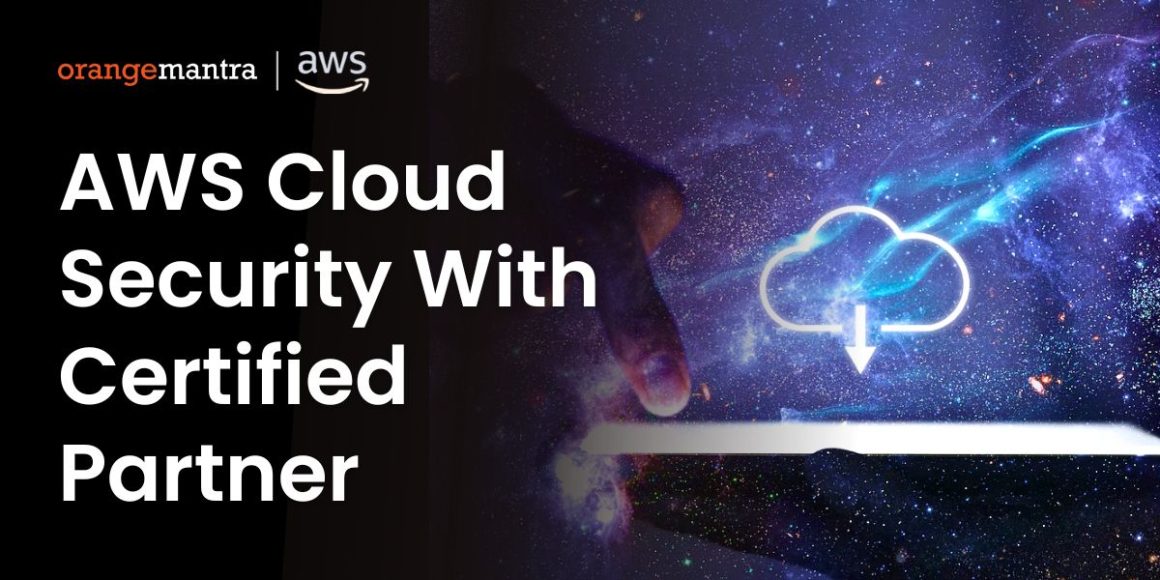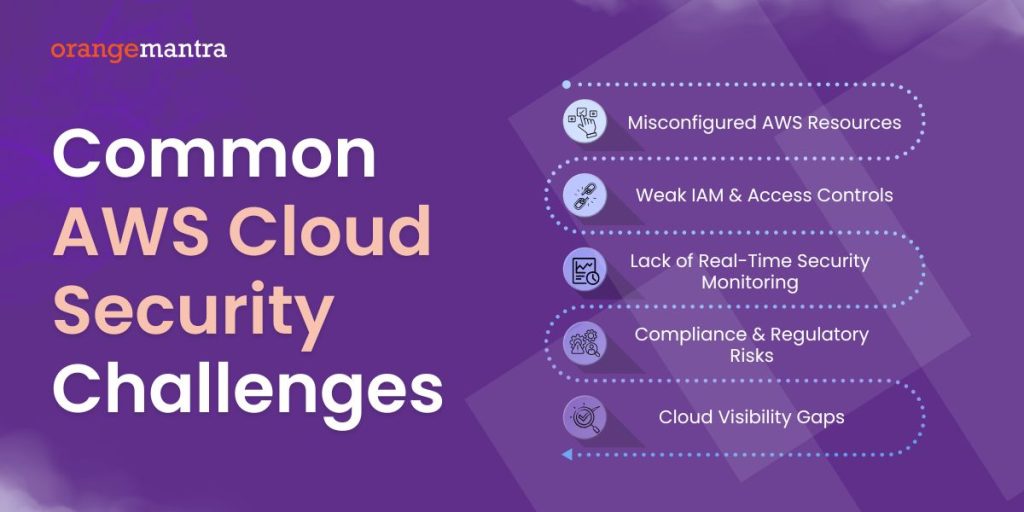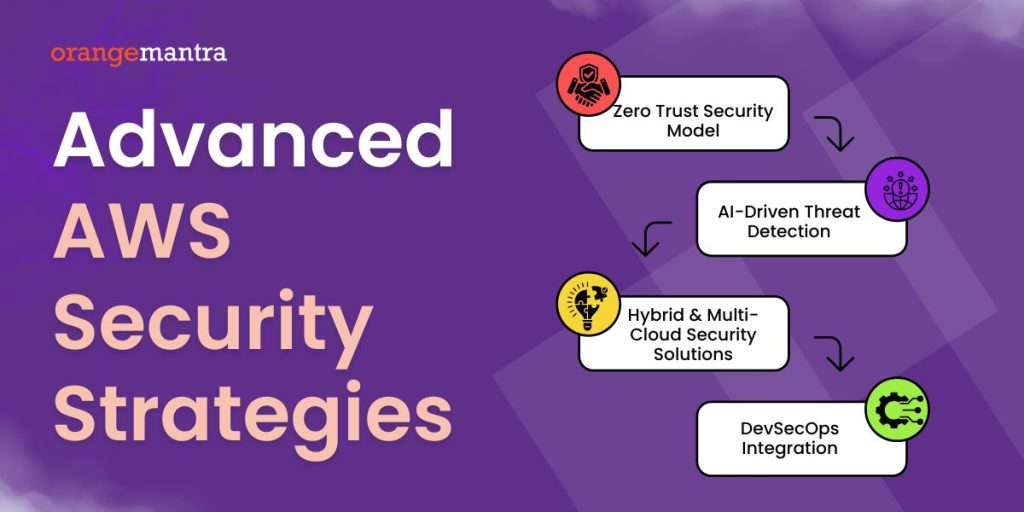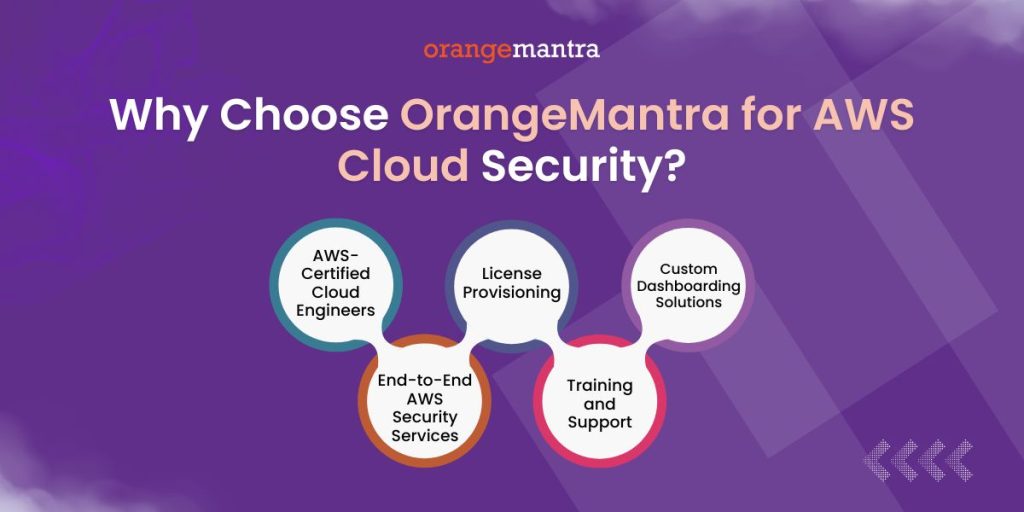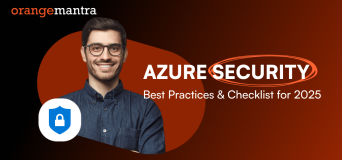Cloud security is a major concern for businesses today. More companies are moving to the cloud. Keeping AWS cloud security strong is more important than ever.
Gartner reports that by 2025, 99% of cloud security failures will be caused by customers. This shows why strong security, constant monitoring, and expert help are important.
Businesses using AWS services must share security duties with AWS. AWS protects its infrastructure, but customers must secure their own data. Understanding these roles can be tricky. OrangeMantra, an AWS Consulting Partner, helps businesses manage cloud security.
OrangeMantra is an expert in AWS security, cloud consulting, and infrastructure management. Need to hire AWS engineers or improve cloud security? Our certified cloud engineers keep your AWS environment safe from threats.
Why AWS Cloud Security Matters
Cloud computing has changed the way businesses work. But it also creates new security risks. Hackers look for weak AWS settings, poor access controls, and unprotected accounts.
Here are some alarming facts:
- By 2025, cybercrime could cost $10.5 trillion every year. (Cybersecurity Ventures).
- In 2023, a data breach cost $4.45 million on average. This is 15% higher than three years ago (IBM Security Report).
- 43% of data breaches happen due to cloud misconfigurations. Most are caused by human errors (Verizon Data Breach Report).
Without strong AWS security, businesses face big risks. They could lose sensitive data, face legal trouble, or harm their reputation.
AWS Shared Responsibility Model: Understanding Security Roles
Many AWS users think AWS handles all security. But AWS uses a Shared Responsibility Model. This means:
AWS is responsible for:
- Physical infrastructure security (data centers, hardware, networking).
- Security of the cloud itself (server management, network security).
The customer is responsible for:
- Security in the cloud (application security, data protection, IAM policies).
- Configuring firewalls, encryption, monitoring, and access control.
Example: If an AWS user forgets to encrypt their S3 storage bucket, AWS won’t fix this for them. The customer must configure encryption manually.
That’s why AWS consulting partners like OrangeMantra help businesses stay secure. We follow ISO, HIPAA, PCI-DSS, and GDPR rules.
Common AWS Cloud Security Challenges
Even with AWS’s built-in security features, businesses face several security risks. Below are some of the biggest challenges:
-
Misconfigured AWS Resources
- Over 60% of data breaches occur due to misconfigured AWS services (Check Point Research).
- Common issues include publicly exposed S3 buckets, weak security groups, and unpatched instances.
-
Weak IAM & Access Controls
- Overprivileged IAM roles increase security risks.
- Many organizations fail to enforce MFA (Multi-Factor Authentication), making accounts easy targets for hackers.
-
Lack of Real-Time Security Monitoring
- Without good monitoring, businesses may miss threats until it’s too late.
- AWS offers GuardDuty, CloudTrail, and Security Hub, but many companies don’t set them up correctly.
-
Compliance & Regulatory Risks
- Finance, healthcare, and e-commerce must follow strict security rules.
- AWS users need to set up security that meets GDPR, PCI-DSS, and HIPAA standards.
-
Cloud Visibility Gaps
- Managing multiple AWS accounts, hybrid cloud, and multi-cloud environments can lead to blind spots.
- Without centralized monitoring, businesses fail to detect security vulnerabilities in real time.
At OrangeMantra, we address these challenges with custom AWS security solutions, helping businesses secure their cloud environments end-to-end.
AWS Cloud Security Best Practices
To strengthen AWS cloud security, businesses should follow these best practices:
-
Secure AWS IAM & Access Controls
- Follow the Principle of Least Privilege (PoLP) – Only grant access to users who need it.
- Enable Multi-Factor Authentication (MFA) for all accounts.
- Avoid using root user for daily operations.
- Use IAM roles instead of long-term credentials.
- Audit IAM permissions every 90 days.
Stat: 81% of hacking-related breaches happen due to stolen credentials (Verizon DBIR).
-
Encrypt Data in AWS
- Use AWS Key Management Service (KMS) to encrypt data at rest and in transit.
- Enable S3 bucket encryption to prevent data leaks.
- Regularly rotate encryption keys to strengthen security.
-
Implement Security Monitoring & Threat Detection
- Enable AWS CloudTrail for tracking API calls.
- Use AWS GuardDuty to detect suspicious activities.
- Set up AWS Security Hub for real-time alerts.
-
Automate Security with AWS Tools
- Use AWS Lambda for automatic security alerts and incident responses.
- Implement Infrastructure as Code (IaC) for consistent security policies.
- Schedule automatic backups with AWS Backup.
Fact: Automation reduces security misconfigurations by 60%.
-
Conduct Regular Security Audits & Compliance Checks
- Follow AWS Well-Architected Framework and CIS Benchmarks.
- Perform penetration testing to identify security loopholes.
- Ensure compliance with HIPAA, GDPR, and ISO 27001.
At OrangeMantra, we implement these AWS security best practices to keep businesses protected from cyber threats.
Advanced AWS Security Strategies
Beyond basic security practices, businesses should adopt advanced strategies to strengthen their AWS security posture.
-
Zero Trust Security Model
- Always verify user access before granting permissions.
- Ensure multi-factor authentication (MFA) and least privilege access.
- Implement continuous monitoring for unusual activity.
-
AI-Driven Threat Detection
- Use machine learning and AI to detect security anomalies.
- Automate responses to potential security threats.
-
Hybrid & Multi-Cloud Security Solutions
- Implement security strategies that cover AWS, Azure, and Google Cloud.
- Use multi-cloud security tools for better visibility and control.
-
DevSecOps Integration
- Embed security into development pipelines.
- Automate security testing for cloud-native applications.
At OrangeMantra, we help businesses integrate these cutting-edge security solutions into their AWS infrastructure.
How OrangeMantra Secures Your AWS Cloud
As a certified AWS consulting partner, OrangeMantra provides comprehensive cloud security solutions, including:
AWS Security Assessments & Risk Management
- Identifying security vulnerabilities in AWS architecture.
- Implementing custom security frameworks tailored to business needs.
Identity & Access Management (IAM) Configuration
- Setting up role-based access control (RBAC).
- Enforcing MFA, password policies, and session monitoring.
24/7 Threat Monitoring & Incident Response
- Deploying AWS Security Hub for real-time threat detection.
- Using AI-driven insights to prevent cyberattacks.
Compliance & Regulatory Support
- Ensuring GDPR, PCI-DSS, HIPAA, and SOC 2 compliance.
- Conducting regular security audits and penetration testing.
Our AWS cloud security solutions help businesses build a resilient, scalable, and secure AWS environment.
Why Choose OrangeMantra for AWS Cloud Security?
Choosing the right AWS consulting partner is crucial for securing your cloud environment. Here are some of the reasons to choose OrangeMantra:
AWS-Certified Cloud Engineers
Our team of certified AWS engineers brings years of experience in AWS security architecture, compliance, and cloud optimization. We ensure that your AWS environment follows industry best practices and remains secure against evolving threats.
End-to-End AWS Security Services
We provide complete AWS security solutions, including:
- Threat Detection & Risk Mitigation – 24/7 monitoring with AWS Security Hub and GuardDuty.
- Access Control & IAM Management – Implementing zero-trust security models and role-based access control (RBAC).
- Data Encryption & Backup Solutions – Protecting sensitive data with AWS KMS encryption and automated backups.
- Continuous Compliance Monitoring – Helping businesses comply with GDPR, HIPAA, ISO 27001, and PCI-DSS.
License Provisioning
Managing AWS licenses efficiently can reduce costs and improve security. As an AWS consulting partner, we help businesses:
- Optimize license costs by selecting the right AWS pricing models.
- Ensure compliance with AWS licensing agreements.
- Manage renewals and upgrades seamlessly.
Training and Support
Many security issues arise due to lack of knowledge about AWS security tools. We provide:
- AWS security training for IT teams to help them manage cloud security.
- Custom workshops on AWS IAM, security automation, and compliance.
- 24/7 support from our AWS-certified cloud engineers for troubleshooting and security enhancements.
Custom Dashboarding Solutions
Security monitoring can become overwhelming, especially when dealing with multiple AWS accounts. We provide:
- Customized security dashboards for real-time monitoring.
- Automated reports on security threats and compliance status.
- Integration with third-party security tools like SIEM for better visibility.
Our Exclusive Offerings as an AWS Consulting Partner
As a trusted AWS partner, we offer exclusive benefits to businesses that work with us. These value-added services help companies enhance security while saving costs.
-
FREE Proof of Concept (PoC)
Before implementing full-scale AWS security solutions, we offer a FREE PoC to:
- Demonstrate how AWS security tools can protect your infrastructure.
- Show how our custom security strategies can mitigate risks.
Provide a real-time simulation of security best practices in your AWS environment.
-
Free Security Assessments
We conduct detailed security audits of AWS environments at no cost to identify:
- Misconfigured AWS services that may lead to breaches.
- IAM vulnerabilities and overprivileged access issues.
- Data encryption gaps that need immediate action.
Benefit: You receive a comprehensive security report outlining the next steps to improve AWS security.
-
AWS Billing Discounts
AWS costs can quickly add up if not managed properly. We offer special billing discounts to:
- Optimize AWS spending based on real-time usage.
- Reduce unnecessary costs on underutilized resources.
Help businesses leverage AWS pricing models like Reserved Instances (RI) and Savings Plans.
-
“My First Assurance” – Guaranteed Security Optimization
When you partner with OrangeMantra, we guarantee security improvements in your AWS environment. Our “My First Assurance” program includes:
- Initial AWS security posture assessment.
- Immediate fixes for high-risk vulnerabilities.
- 30-day security monitoring & optimization trial.
If we don’t improve your AWS security posture, you don’t pay for the first month!
“Security is not a product, but a process.” – Bruce Schneier, Cybersecurity Expert
Final Thoughts
AWS cloud security is not just about protecting data. It also keeps businesses running smoothly. As cyber threats grow, companies must stay ahead with strong security plans.
By working with OrangeMantra, an AWS consulting partner, businesses get expert help. They can hire AWS engineers, improve AWS services, and boost security. Our certified cloud engineers create a safe and scalable AWS setup.
Ready to secure your AWS cloud? Contact OrangeMantra today for a free security consultation!
FAQs about AWS Cloud Security
-
How often should businesses perform AWS security audits?
It’s best to do AWS security audits every three months. But if you handle sensitive data, check security every month.
-
What are the biggest security risks in AWS?
Some of the biggest security risks in AWS include:
- Misconfigured IAM roles
- Publicly accessible S3 buckets
- Unpatched EC2 instances
- Weak password policies
- Lack of encryption
-
Can AWS security be fully automated?
Yes! AWS offers automation tools to find and fix security risks. These include AWS Security Hub, GuardDuty, AWS Config, and Lambda.
-
How can businesses ensure compliance with AWS?
Businesses should follow AWS compliance frameworks, such as:
- AWS Well-Architected Framework
- CIS Benchmarks
- ISO 27001 and GDPR security guidelines
-
Why should businesses hire AWS engineers for security?
AWS security needs expert knowledge. It includes setting up IAM, monitoring tools, and following rules. Certified AWS engineers help businesses prevent hacks and improve security.
